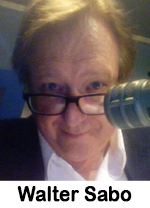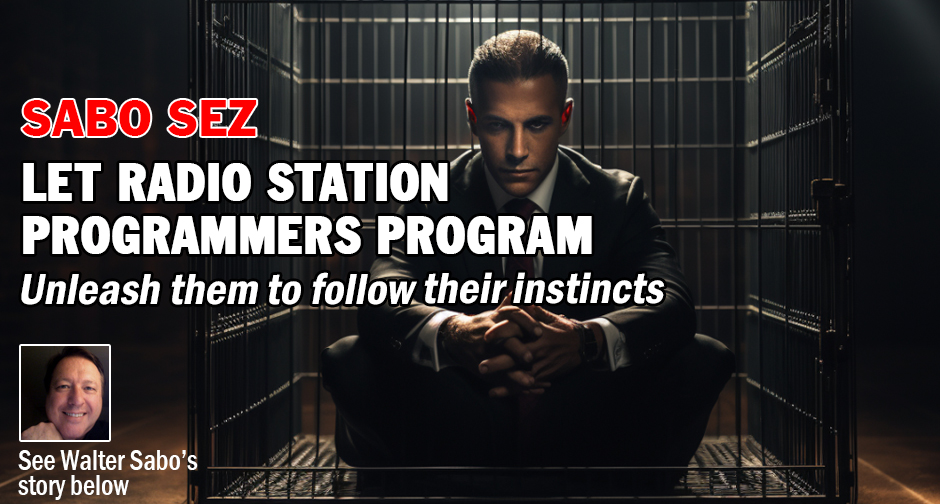SABO SEZ: Award the Future
By Walter Sabo
Consultant, Sabo Media Implementers
A.K.A. Walter Sterling
Radio Host, “Sterling On Sunday”
Talk Media Network
 When reviewing our industry’s awards such as the Crystals or Marconis there are two categories missing. They are: “Best New” and “Best Innovation.” Imagine if winners were announced for these prizes:
When reviewing our industry’s awards such as the Crystals or Marconis there are two categories missing. They are: “Best New” and “Best Innovation.” Imagine if winners were announced for these prizes:
“Best New Talent On Air”
“Best New Talent Off Air”
“Most Creative Sales Solution”
“Most Creative Station Promotion”
“Most Innovative DAB or Podcast Format”
“Best New Talent – Podcast”
“Best Innovation In Engineering”
Those awards aren’t fantasy, they are actual awards given annually by Australian Commercial Radio (ACRA). They are presented at a magnificent well-produced event for the entire country – attendance is SRO. The subliminal message to Australian radio personnel is powerful: Innovation is expected and rewarded. NEW is expected and rewarded – no need to wait for you to become legendary (!) to be recognized. “NEW” is a powerful reward and promise to the talent you hope will find a career in radio. Face it, our “on boarding” leaves a lot to be desired. (Hey, work in the promotion department while you live at home, and we’ll let you pick up pizza that you can share!)
The best gift the late PD Al Brady Law gave me was he greeted all new ideas with, “It might work.” Most other executives kill innovative thought with the worst question possible: “Who else is doing it?” The industry has a lame record of assessing new ideas. New ideas are systematically despised:
Bill Drake’s format was damned in jock-for-hire classifieds that warned, NO DRAKE JOCKS. Yes, dozens of stations wanted NO DRAKE JOCKS. Quickly Drake’s strategies slaughtered those stations and revolutionized music formats to this moment. Recorded music on the radio was actually thought to be illegal until WNEW-AM, New York fought that court fight in the 1940s and won. All news on WINS and WCBS certainly was not going to work after the 1960s New York newspaper strike ended. WFAN could never succeed as an all-sports station – soon after launch it became the highest biller in NYC.
When AC was launched in 1978 at the NBC FM and RKO FM stations, it had no future. FM was only for beautiful music and hard rock and besides who else is doing it?
Album rock, AOR, …why we have research to prove young people only want hits! Targeted FM talk – combining a hot format with hot talent would absolutely fail at KLSX-FM, Los Angeles and thanks to Bob Moore became the number one local biller – turn it back to the failed classic rock format please begged one research hit squad! “New Jersey 101.5” has a one million cume talking all week, playing music all weekend. Which award category suits that giant station? “Best New” would have been appreciated.
Todd Storz, the inventor of Top 40, passed away at 38 and his father who owned their stations in Miami, Omaha, and New Orleans couldn’t wait to change his Top 40 format creation to MOR when the kid died. As a result, when Todd died the stations died, too.
Innovators like Bill Drake, Jeff Smulyan, Allen Shaw, Bob McAllan, Alan Mason, L. David Moorhead, and Howard Stern are first ignored, then marginalized, then vilified… then hundreds fight for their credit.
The only way radio stays relevant and grows its place on the media landscape is with a constant flow of “Best New” and “Best Innovation.” That’s when younger listeners are attracted to radio – the same way they are attracted to everything – if it’s NEW. The radio you and your friends were drawn to, talked about at school, listened to constantly was saturated with new contests, new daring DJs, new promotions, new hits, new energy.
The delicious daily challenge of on-air talent and management is what can we put on the air today that has never been done before? If it’s new, even if it doesn’t work forever, generates buzz, attention, youthful audiences. Of course, 20-year-olds will listen to radio, it’s at the end of their arm! But they are not going to salivate at the promise of “20 of your favorites from the 80s, 90s and today.” Or a national contest.
Why not test a NEW award in just one awards category? “Best Innovation in Engineering” The Marconi Award.
Walter Sabo is a leading media industry consultant and syndicated talk radio personality. He can be emailed at Walter@Sabomedia.com. Website: www.waltersterlingshow.com



